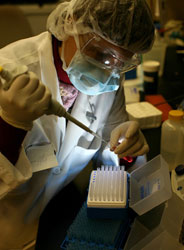Natural killer cells in healthy elderly
The elderly suffer from increased susceptibility to infectious diseases and cancer. Immunosecescence, or ageing of the immune system is a multifactorial condition. T-CIA, a European funded project, has investigated the phenomenon of T cell immunity and its malfunction as a result of ageing. Project partners at the hospital of Reina Sofia in Cordoba, Spain studied young and elderly groups for T cell properties and activity. The chromosomes of cells have an end region called the telomere that incorporates a lot of repeating DNA. With successive cell divisions, it has been observed that the telomere becomes increasingly short. The theory is that this protects the more valuable DNA lower down on the chromosome that is required for cell integrity and function. Two attributes of the immune system measured were telomere length and presence of CD28 molecules. CD28 positive individuals can provide signals for T cell activation. The results showed that there was a shortening of the telomere in the elderly. Interestingly, this was associated with a significant increase in CD28 negative individuals. In a second strand to this research, the types of T cell were studied. The numbers of naïve T cells were found to be higher in healthy donors whereas effector T cells were more common in CD28 negative individuals. Naïve cells can differentiate into memory T cells which can recognise invaders. Effectors however just tend to direct other immune cells. Possessing long telomeres in immune cells and having lots of naïve T cells then appear to be two of the prerequisites for an efficient immune system. The continuation of this work could well lead to possible intervention therapy for those individuals with aged T cells. If alterations in the immune system in the elderly are defined, then it will be possible to devise strategies to counter these immunodeficiencies.







